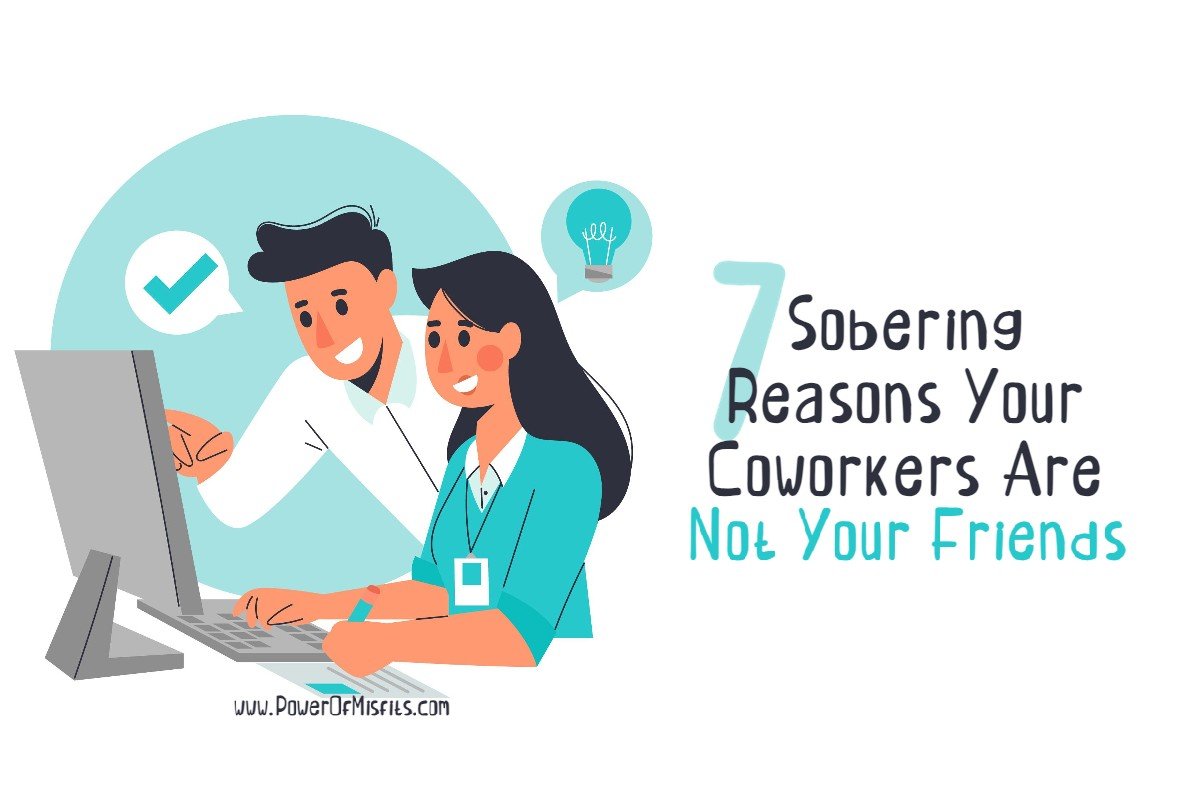We all want to have a great relationship with the people we work with. It’s natural. You see them every day, so you want to get on well with them.
But at the same time, your coworkers are not your friends, and there are some sobering reasons why.
The truth is that workplace friendships can play a cruel trick on you. Before you even realize it, your friends at work can get you into trouble and even ruin your career.
7 Reasons Why Your Coworkers Are Not Your Friends
1. Getting too personal with your coworkers can play a cruel trick on you
Oversharing is never good, be it on social media or in the workplace. In fact, it can have damaging consequences for your career.
If you become friends with a coworker of yours, it’s natural to share personal things with each other at some point. But what if your work friend turns out to be a different person than you thought? For example, they may talk behind your back or turn out to be the office snitch.
Besides, misunderstandings happen, and your friendship can end as quickly as it started. What will you do if your work friend decides to take revenge and use your secrets against you?
Think about it before getting too close to a coworker. Not everyone is your friend. Just like an office romance, a work friendship can ruin your career if things go wrong.
2. Fake corporate culture

The office culture is pretty much the same in most companies, regardless of the specific job you are doing. You are supposed to be nice to everyone, keep your emotions and thoughts to yourself, and agree with your supervisors. It’s also good to give your boss some fake compliments from time to time and laugh at their lame jokes.
In this kind of environment, it’s easy to confuse someone’s fake niceness for genuine friendliness. You may start to see your coworkers as your friends and loosen the ties. You begin to tell them personal stories, make controversial jokes, and be careless about your words in general.
In reality, you never know who you are dealing with. If a coworker is nice to you, it doesn’t mean that they are your friend. The corporate culture itself creates this kind of fake environment where it can be hard to see someone for who they really are. Always keep that in mind.
3. Some people just pretend to be nice in order to take advantage of others
This fake office culture, paired with a competitive environment, attracts all kinds of predators. Certain people do their best to appear friendly so that they can get closer to their coworkers and take advantage of them.
It can be a way to take care of competitors and get a promotion. Or get their colleagues to do the job for them. Some people are truly devious, so it’s better to watch out, especially if you are new to the workplace.
Do you have a coworker who is always overly nice to everyone? Do they show excessive interest in you and ask you questions about your life? Maybe you’ve heard them gossiping, changing their behavior and tone of voice around different people, or asking others for favors?
If you know someone like this at work, it’s better to stay away from them. Most likely, this person is fake. And it’s also a good reminder that your coworkers are not your friends—even when they are friendly to you.
4. Your coworkers may exploit your kindness
Taking advantage of others doesn’t always stem from someone’s devious nature. Sometimes your coworkers ask you for favors all the time and end up exploiting your kindness just because you are friends.
It happens unconsciously—they know that they can rely on you, so they turn to you for help. The problem is when this becomes a habit.
At some point, your work friend starts to take your help for granted. You gave them a hand so many times before, so they assume that you won’t have a problem to do it again. They find this situation convenient because you are both a coworker and a helpful friend.
That’s another disadvantage of work friendships.
5. Being friends with your coworkers makes it hard to set boundaries at work

When you have a strictly professional relationship with your coworkers, it’s much easier to set boundaries. You feel like you don’t owe these people anything, so you stand your ground. But what if you have an emotional connection with your coworker because you are friends?
This is where things get much more complicated. You find it difficult to say no and set firm boundaries.
For example, you need to divide responsibilities during a new project. As a result, you end up taking on more tasks than your coworker, and you don’t know how to tell them about it.
This is because you see your coworker as a friend, and you don’t want to start an argument or let them down.
6. Your friend at work can get you into trouble
When you are friends with a coworker, at some point, they may ask you to cover for them. Or even tell lies to your supervisor.
For example, your colleague wants to go on a getaway with her boyfriend, but the boss won’t give her a day off. After the weekend, she doesn’t show up at work. Then she calls you, asking you to justify her absence and say that she is not feeling well today.
You hate to lie, but you don’t want to let down your friend, either. It’s a tricky situation.
Not only does this put you into a moral dilemma, but you also risk getting into trouble because of your friend’s behavior. What if your boss finds out? You will have to face the responsibility of covering for your friend.
Therefore, to avoid such kinds of situations, it’s better to keep your coworkers at a professional distance. Your colleagues are not your friends—they are just people you work with.
7. Gossip is common in the workplace
It can be daunting to sit down and work for hours. People need a distraction in order to relax a bit.
Oftentimes, gossip becomes an easy distraction from the dull office routine, especially when there is no entertainment available. For example, many employers choose to restrict Internet access in the office.
When you get too personal with a coworker, you can’t know what motives they have. Do they genuinely like you and want to be your friend? Or are they just looking for gossip? If you confide in a coworker, thinking you are friends, you can’t be sure that the details of your life won’t become known to everyone else in the office.
People don’t gossip only because they are jealous or judgmental—sometimes they do it merely for entertainment. It’s common for office workers to spice up their boring days at work with the juicy details of someone’s love life.
For this reason, be careful about what you reveal to your colleagues. Sometimes it’s better to keep quiet about certain things. It’s a great idea to be nice to the people you work with, but don’t forget that your coworkers are not your friends.
Therefore, the best thing to do is to be friendly to your colleagues but keep things professional.
Featured image by Freepik


